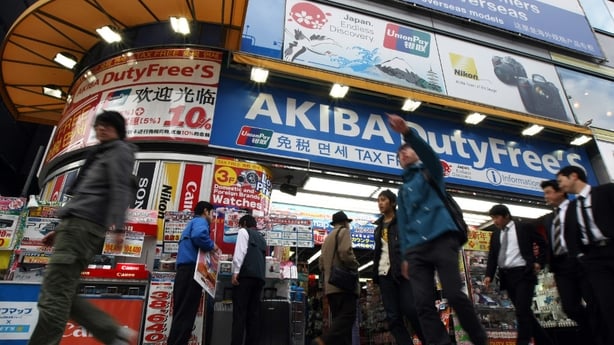Japanese inflation stalled in February with a key measure of prices flat for the first time in nearly two years, data showed today, weighed by a plunge in oil rates and tepid consumer spending.
The dismal figures come after Bank of Japan chief Haruhiko Kuroda acknowledged this month that dragging the country out of years of deflation was proving to be "very challenging".
He also warned that inflation may temporarily fall to zero.
While core inflation, excluding volatile fresh food prices, rose 2% in February, a measure that strips out the impact of a sales tax rise last year - which is the Bank of Japan's benchmark - came in flat from a year ago.
The reading was far short of the goal of sustained 2% inflation and marks the first month of zero growth since May 2013, just after Tokyo launched a high-profile bid to kickstart the economy and conquer deflation.
Inflation is a key measure of Prime Minister Shinzo Abe's plan to end years of stagnant or falling prices that have been blamed for holding back growth in the world's number three economy.
Prices had been on the rise after the programme was launched, largely due to Japan's heavy post-Fukushima energy bills as it turned to pricey fossil fuel alternatives following the atomic accident.
The so-called Abenomics growth blitz - including big government spending and massive central bank monetary easing - helped pull down the yen, which in turn pushed up import costs.
But oil prices have tumbled since the summer and consumers snapped their wallets shut after the government raised sales taxes to 8% from 5% in April to help pay down Japan's enormous national debt.
Doubts are growing over what many see as an overly ambitious inflation target - even among policymakers themselves.
Minutes from the central bank's January meeting showed that three of nine BoJ board members doubted the chances of reaching the price target.
Separate data today showed spending among Japanese households dropped for the 11th month in a row, although the 2.9% decline in February from a year earlier was smaller than the 5.1% fall in January.
The country's unemployment rate edged down to 3.5% in February from 3.6% a month earlier.
Following annual labour talks, many companies have responded to Abe's call to boost wages, which he sees as crucial to putting more money in workers' pockets and driving up spending.
But a majority of economists surveyed by Bloomberg News this month expect another round of easing by October, even as the economy crept out of a brief recession in the last quarter of 2014.
Japan PM calls time on late evening working
Japan's famously long working hours will get a shakeup this summer, the government said today, with Prime Minister Shinzo Abe pushing early starts and European-style flexibility.
In a bid to better balance work and play for Japan's stressed employees and to encourage them to spend time and money on private life and leisure, the government wants the working day to start - and end - earlier.
"Prime Minister Abe said we would take on changing the summertime lifestyle so that (people) will start working early in the morning and spend time with families and others in the evening," Chief Cabinet Secretary Yoshihide Suga said.
To begin with, central government officials will promote early starts and flexible finishes, Suga quoted the premier as saying.
"It is often said that long work hours in our country keep people from appreciating its benefits," Suga said.
"We believe reforming work styles is extremely important in letting people feel the benefits of 'Abenomics' and making our country's growth sustainable," he said, referring to the government's programme of economic reforms.
According to statistics from the Organisation for Economic Co-operation and Development, the average Japanese put in 1,735 hours' work in 2013.

This is far more than the 1,489 of France and Germany's tally of 1,388, but fewer than the 1,788 of the US.
However, labour experts suspect Japan's true number is higher, with employees under-reporting overtime in a culture where presenteeism prevails.
Employees are sometimes expected to spend time with their colleagues in the evening, with often-alcohol fuelled bonding sessions practically compulsory.
The prime minister has told his ministers to talk to private companies about the push for change, in the hope of dragging them along with the initiative, Suga said, adding that summer had been chosen because of its longer daylight hours.
But, he said, the introduction of daylight saving was not currently on the table because of the huge latitude differences of the Japanese archipelago
"Considering that, I think we need careful consideration at the moment towards ticking up our country's standard time in a uniform way," he said.
In summer months the sun rises in Tokyo at around 4:30 am and sets by 7:00 pm.
Japan has previously mulled an annual time change like that in Europe or North America where the clocks go forward in spring and back in the autumn, but has never tried it.
Opponents cite reasons ranging from the simple nuisance of changing time and the risk of inviting even longer work hours to the possibility of increasing home air-conditioning demand in the evening.

